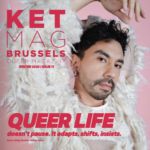For the first time in Belgium, non-binary individuals will soon be able to request an identity card without any mention of gender. Hailed as a symbolic step forward, the reform is already raising concerns among LGBTQIA+ advocates.
Interior Minister Bernard Quintin (MR) announced the introduction of two types of ID cards. By default, Belgians will receive a card marked “M” or “F”. But upon formal request, it will be possible to obtain a genderless version.
While many see this as a step toward visibility for people outside the binary, LGBTQIA+ organisations remain cautious. “This is not what we asked for,” says Erynn Robert from Prisme, the federation of queer associations in Wallonia. Çavaria, its Flemish counterpart, adds that “nothing changes” for non-binary people, apart from having to “make their gender invisible”.
Critics highlight that the national registry number still reveals the gender assigned at birth, and that the reform could expose non-binary individuals to risks, especially when traveling abroad. Moreover, only offering the neutral card upon request could unintentionally create a new form of outing.
Prisme also regrets the lack of consultation and underlines that this reform falls short of addressing the 2019 Constitutional Court ruling, which challenged the binary-only approach in official documents.
A symbolic breakthrough, yes—but perhaps not yet the structural change many had hoped for.
You may also like
-

The New KET Is Out: Queer Brussels Keeps Moving
KET Magazine Issue 11 is out now and available in LGBTQIA+ safe spaces across Brussels,
-

Brussels Art Guide 2026: Mapping a Vibrant Contemporary Scene
Brussels is once again putting its contemporary art scene in the spotlight with the new
-

What is Sex-Positive Belgium?
Sex-Positive Belgium is a growing, real-life community of open-minded people who embrace a sex-positive philosophy. It welcomes
-

“Bi+ Equal: Europe’s First Platform Uniting Bi+ Communities Across Borders”
Bi+ Equal is the first-ever bi+ structure at the European level, a new platform created
-

“From Borders to Belonging: How Arc-en-Ciel International Guides LGBTQIA+ Migrants to Safety and Community”
Arc-en-Ciel International Rainbow (AIR) is an online platform created for and with LGBTQIA+ migrants, refugees

